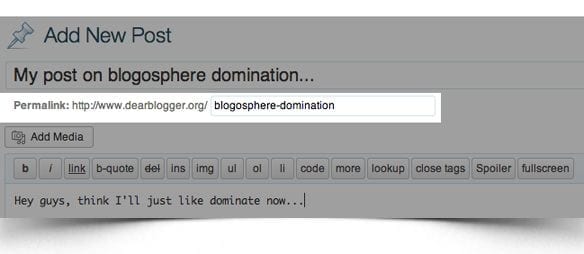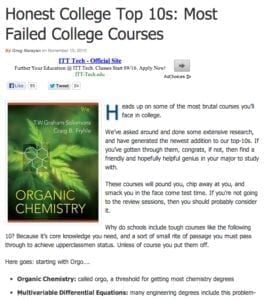Dear Readers,
Ranking in Google is impossible. Bloggers will never be able to compete with the Yahoos, Ask.coms, About.coms etc etc etc so don’t even bother!
Yeah, right.
If you run a blog or personal website, you’re going to need rankings, more specifically, organic Search rankings from Google. This brings you sustainable traffic, so you can focus on other things like building content.
And nothing shady or even grey hat, but back when I ran a university blog, I found a few rather simple methods for ranking odd content in organic Search. I want to reveal them here.
Note to YOU: I bet my readers have been building SEO while I was away on hiatus and I’d love to hear about it. If this post gives you an edge in SEO, say hello in the comments. Been a while (my fault).
What’s inside this article?
As I planned out this post, I tried to think up a concise game plan for ranking your posts that also included tidbits on keyword research, building backlinks, and more. What I came up with is:
- An outdated post that still brings in heaps of organic traffic
- 5 criteria for getting your posts inside Google’s top 10
- 2 tools to generate relevant ideas for your next post
- What most bloggers get totally wrong about backlinks
- A video on how to pick the perfect keyword density
…and most importantly, I hope this gives you confidence to write posts that rank well in Google.
Sure, we’re competing with millions of others, but whether you run a baking website, fashion blog, or environmental awareness group there are always openings for articles that rank really well.
I figured it’d help to put things in perspective first.
Problem: How do you separate from the masses?
Blogging is totally overwhelming and I know from experience. Back when I had no job, no side income, I’d sit at the computer and furiously spin off posts hoping one would make me rich. (Hint: blog posts don’t make you rich)
Like I’m sure you do, I was comparing myself to huge sites like LifeHacker that have huge resources, lots of SEO power, and can write articles that almost instantly went viral. I’d even email these folks asking to write for them, with a roughly 99% rejection rate.
What I had to do, what you have to do to overcome this frustration, is look at what aspect of your blogging makes you unique. What insanely trendy, relevant topics can you cover?
When you do so, you can create with authority and ease. See, you don’t need to be a huge website to rank. Websites have specific guidelines, review procedures, and lack personal authority. They’re slow. They have hundreds of people to pay and account for each day.
As a solo-blogger, you can research Google Trends, find openings in Alexa, do the research at Google and fire off posts in a day or two that bring crazy traffic to your blog. Once you do this once, you’ll be inspired to do it again, and again, and again.
What one single post can do
Just like the road to winning Wimbledon starts with winning one game, the path to becoming an authority in Google’s eyes starts with one post, a post that can:
- Surpass other every other post on your blog in about a week?
- Attract tons of natural backlinks?
- Get more visitors than your homepage?
- Lure in visitors who then feast on the rest of your content?
I mean, how do you think sites like About.com and all those subdomains on Yahoo started building rankings? They wrote highly relevant articles. They hired writers who churned out content. Unfortunately however, most our budgets are limited to expert blog design and blog hosting, and that’s it. But as we’ll see in the next section, you can write SEO friendly posts on your own.
A simple post that ranks
Here’s the list post I that inspired me to write this post. It was probably the 50th post I ever wrote, and it ranks for the phrase “most failed college courses.” To test out that Google Search, click here.
Why this phrase rocks (for me):
- Likelihood to fail is the #3 indicator a university student will choose a course, behind average GPA and chosen major…
- …Which meant thousands of kids around the globe searching this phrase at least twice a semester, and landing on my blog, filled with lots of other college advice.
This simple list post had everything going right for it, even though if you check it out, it’s low quality by most Google standards! The Huffington post article (of higher quality) often ranking right below my post references specific colleges, average grades, and even includes quotes from real students! So, why doesn’t my simple list post rank so well?
Why this post climbed the rankings
Here are the 6 reasons my post climbed past over 16 million Search results and hit the top 10.
One really strong backlink
In my first months of blogging, the gals over at HerCampus linked this post in one of their weekly roundups. This was great because the backlink was both credible and relevant to my niche, and the effect was 3-fold:
- Instantly noticed and ranked by Google
- Became relevant almost overnight
- Click thrus sent readers to my blog who liked and shared the post (guest it wasn’t too awful?)
Descriptive permalink
Given I didn’t know how to edit a permalink back then, this was really lucky. I just wrote a title carelessly like I did those days and hit publish, and “most failed courses” made it into the link. Google looks directly at your permalinks when ranking your posts for a phrase, so you had better get good keywords in there.
If you’re a WordPress.org blogger (like you should be), use Custom Permalinks to do this:

Healthy amount of keywords
Aside from the permalink/URL, you need keywords in the title of your post, adjacent to the title, and around other places in the body content at a decent density.
Here’s a neat video I dug up by Matt Cutts, on keyword density:
Original
As I mentioned above, the post isn’t any Seth Godin piece or Banksy painting, but it does have some flare. I use a drop letter at the start, a bit of humor, and some commentary after each bullet point in my list. I don’t know about you, but I’m 99% sure Google notices when you add a little extra flare to your blog posts, Office-Space reference not intended.
Authority
In my case, this list post was a big help to brining authority to the blog it was on. This could work the other way however, where the blog’s authority helps the post do well. But if you’re just starting out like I was, you’re much better off building authority around one or a few posts than rushing the authority aspect of your whole site.
Unique
Possibly the most important part of this post was that it covered a topic where no one had written much of anything. This was back in 2010 when the whole “college blogging” thing was relatively new, and my post filled a gaping hole.
Note: If you do the Google search which brings up my post, am I ahead of Huffington Post in your window? That’d make me totally content for the day.
Note 2: You can actually create entire websites around uncovered topics, then leverage the site to gain affiliate sales, pad your subscriber counts, and more as Glen cleverly points out here.
Picking an uncovered topic was largely trial and error for me; I was writing rapid fire and sort of bound to hit a good one. But in your case, if you’re stuck on topics then here are some suggestions.
Tips for picking topics/keywords
I know it stinks, I know it seems tough, I know you’d rather just start writing, but before you spend time creating your blog post, take a moment and think of what keyword phrases you’re targeting.
Here are some posts and the keyword phrases they attempt to rank for:
- How to Make a Review Site that Earns $1000/Month
Topic: Creating a profitable review site
Phrase: “review site” - The Future of Blogging: I Had to Tell You This
Topic: Review of neat blogs that profit from advertising
Phrase: “future of blogging” - 29 Essential Tips from Top Google Plus Geeks
Topic: Best ways to use Google Plus
Phrase: “google plus tips”
The first post is mine, while the second two posts here come to you from my buds Viper Chill and Blog Tyrant. The point here is to show you how simple phrases work best. Try Googling those phrases now 🙂
In rare cases, a post will want to rank for a really long-tail phrase, or perhaps the author just can’t narrow things down, but in the majority of cases your keywords should be simple.
So, if you haven’t picked up on this yet, finding an idea for a post and picking out your keywords are two very similar, interdependent tasks.
What we often forget about backlinks
I think we’ll wind this post down with some perhaps less than obvious tips about backlinks.
- Still #1
Backlinks still represent a vote for your content on the web; despite all the changes to Google they still remain the #1 contributor to your Search rankings. - Should be relevant
I say should here because a link from an auto insurance site would help your blog post on SEO tricks, just not as much as if that link came from somewhere like SEOmoz. - Should be credible
Penguin and Panda really devalued phony links, but that doesn’t mean a link from your friends PR1 blog won’t still help out. Everything adds up. - One can be enough
If you picked a keyword phrase and niche topic that’s truly unnoticed and uncovered like I did (unintentionally), then one good link is often times enough to catapult you into the top 10. - Organic is best
Like strawberries, backlinks are most delicious when they come naturally without preservatives. In Google’s ideal world, people link to other blog posts naturally, because they were inspired or challenged by the content. And while I do this all the time to my friends’ work, a lot of folks still don’t seem to understand this. Take this post Billy Murphy just came out with. It’s been linked to and shared countless times because it’s just so darn unique, so helpful, so timely. If your blog post is really going to rise up, you shouldn’t have to ask for promotion or linkage, unless your site is really, really new or something.
Keeping your rankings
In the aftermath of your blog post that hopefully takes off, you can do one of two things. Leave it be, and focus on new content, or continue to promote that blog post. If you’ve done the above steps to build organic traffic, that post should increase in popularity, but I like the second option far more. Continuously promoting your blog post will guarantee more readers, more Likes, more shares, and more links which will only speed up the process of ranking in Search and help you stay there over time.
The un-usual discussion
It’s definitely been a while since we had a lively discussion here, but maybe a good refresher is what we all needed. Nothing crazy or outlandish, but I’m wondering…
Do you have any top 10 phrases under your belt? If not, what steps from my post above will you use on your next blog post?
Let’s chat it up. And yah, time for second coffee here at 11 pm. I think a long night of studying is just beginning… 😯







Hey Greg, wow great piece of knowledge here. Thanks for sharing your strategy of ranking in Google’s top 10.
My question is that to keep my rankings, I should just keep sharing the post? I had few posts ranked #1 on Google, but they’re slowly taking off. I want the ranking back.
hey Ehsan
keep tweeting it and adding more sections
there’s a 3rd hot tip… (stayed tuned, prolly saving it for my next post) 🙂
Okay don’t take too much time, looking forward to that post.
Did you check my latest post? You’ve got a link to your branding guide there 🙂
Hi Greg,
You are really an inspiration. I read your e-book and implemented the bold font ( to size 18) suggested idea. Honestly, I have started seeing improved traffic.
Thanks for this post, also very insightful
that’s so great Samson! glad my eBook helped!
Thanks for mentioning my post Greg. Glad you enjoyed it!
Do you really answer 150 blog questions every morning?
you’re welcome Billy!
varies, 150 was the daily average when we launched. did you really work for an investment bank?